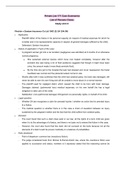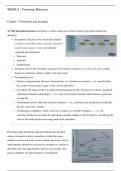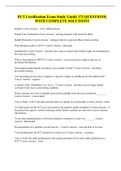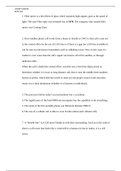Private Law 171 Case Summaries
Law of Persons Cases:
Study Unit 2:
Pinchin v Santam Insurance Co Ltd 1963 (2) SA 254 (W)
● Applicants:
○ Plaintiff: father of the foetus in his personal capacity (in respect of medical expenses for which he
is liable) and in his representative capacity (in respect of general damages suffered by the child).
○ Defendant: Santam Insurance
● Nature of application / Facts of the case:
○ A pregnant woman got into a car accident (negligence was admitted) at 6 months of an otherwise
normal pregnancy.
■ She sustained external injuries which have now healed completely, however after the
accident she was losing a lot of fluid (evidence suggests that though it might have been
urine, the amount made it more likely amniotic fluid).
■ By the time she got to the hospital the leak had stopped and never reappeared; the foetal
heartbeat was normal and the placenta looked normal in size.
○ Shortly after birth it was confirmed that the child had cerebral palsy; his brain was damaged, will
never be able to earn his own living and will be unable to move about in a normal manner.
○ The plaintiff sued for negligent delict, which caused the child to be born with brain damage.
Damages claimed: (patrimonial loss) medical expenses; on his own behalf (he has a legal
obligation to take care of the child)
○ Satisfaction: (non-patrimonial damage) infringement on personality rights; on behalf of his child.
● Legal question:
○ Whether SA law recognises a claim for prenatal injuries / whether an action lies for prenatal injury
to a foetus.
○ The medical question is whether there is in this case a chain of causation between an injury
sustained by the pregnant mother and the fact that the child suffers from cerebral palsy.
● Decision:
○ The court found that such a claim does exist in our law; all the rights of a born child are given
when it is to the advantage of a foetus, and there is no basis not to extend the fiction in this case.
○ However, the court also found that the claim did not succeed on the facts because not all the
elements of a delict could be proven medically on a balance of probabilities.
● Ratio decidendi:
○ Point of departure: common law (nasciturus fiction).
○ The judge considered texts from Roman & Roman-Dutch law, where the nasciturus fiction was
applied to succession and status; nowhere is it expressly stated that this reasoning cannot be
, applied to law of delict or prenatal injury (the judge speculated that this wasn’t considered/stated
because medical science was not advanced enough and it was not possible to prove a cause or
link) and none contend that the foetus can be a bearer of rights and obligations - the position is
merely that the vesting of rights is kept suspended until the nasciturus is born. The judge further
found that in looking at the Motor Vehicle Insurance Act which provides for ‘persons’ to be
compensated, whether the foetus is considered a ‘person’ or not is irrelevant if the fiction applies
to its advantage; the question is purely whether the fiction applied outside the law of property to
include the law of delict.
■ The judge saw no reason to limit the fiction to the law of succession (grant legal subjectivity
with regard to property) and not extend it to the law of delict (not grant legal subjectivity
under life and health status).
● In a Canadian court case (Montreal Tramways), it was found that such a claim exists;
“If a right of action be denied to the child it will be compelled without any fault on its
part, to go through life carrying the seal of another's fault and bearing a very heavy
burden of infirmity and inconvenience without any compensation therefore”.
● The judge claimed that there would likely be action in the case of dolus and therefore
it should not be denied in the case of culpa; it is not unforeseeable that a pregnant
mother may be travelling on the highway. “To introduce contract (only contract to
mother) would be a poisonous fallacy; and as for the duty of care, in the present case
the driver of the insured car owned a duty to all other persons on the road, whether
fictional persons or not.”
○ However, the claim did not succeed on the facts because not all the elements of a delict could be
proven medically on a balance of probabilities.
■ In the result the likelihood that the loss of fluid led to cerebral palsy is not stronger than the
opposite contention.
Road Accident Fund v Mtati 2005 (6) SA 215 (SCA)
● Applicants:
○ Appellant: Road Accident Fund
○ Respondent: Mtati (father of child)
● Facts of the case:
○ A motor vehicle was being negligently driven at the time and the respondent's wife was a
pedestrian. She sustained serious bodily injuries.
○ The child was born five-and-a-half months after the collision. It was alleged that child had brain
damage and was mentally retarded, which arose out of injuries sustained as a result of the
collision.
○ The father instituted a claim on behalf of the child against the Road Accident fund.
,● Legal question:
○ The right of a child to sue for prenatal injuries is recognised in law, but should such an action be
allowed by using the nasciturus rule or by using ordinary principles of the law of delict?
● Decision of court a quo:
○ Based decision on Pinchin case (which laid down a precedent).
○ The judge interpreted the meaning of ‘person’ in the relevant motor vehicle legislation that grants
right to damage; stated that ‘context is thus all’ - legislation serves victims for losses that they
suffer. The judge held that there was a 'care of duty’ of the driver in respect to an unborn child.
○ ‘Open the floodgates of litigation’ argument: the judge stated that this was not going to happen
because this decision is very specific to damage to an unborn child, and the right of a child to sue
for prenatal injuries recognised in this judgment is expressly based on the holding that the right of
action only became complete when the child was born alive; elements of delict, including
causation, still need to be proven; thus this argument is invalid.
● Decision of SCA:
○ On behalf of the appellant, there are 2 grounds for appeal:
■ The appellant contended that the child was a foetus in utero at the time of the accident and
therefore could not be regarded as a ‘person’ entitled to compensation under art 40 of the
Agreement set B out in the Schedule to the Multilateral Motor Vehicle Accidents Fund Act 93
of 1989. Under these circumstances, the insured driver could not either owe a duty of care to
the foetus.
■ When affirming whether an action for prenatal injuries exists, the judge looked to the
Montreal Tramways case and how it contributed to the ultimate Pinchin decision: a
registered insurance company (such as the defendant) has to compensate; the definition of
‘person’ is irrelevant with the application of the fiction.
○ However: is it necessary to extend the nasciturus fiction or is the law of delict sufficient for the
claim?
■ Took into account the opinions of academic authors who agreed or disagreed with Pinchin
case: some found that the law of delict is sufficient since the damage only sets in once the
child is born with a disability, and the act/conduct and damage can be separated in time &
space; others believed the damage immediately has to set in.
■ The damage is suffered by the plaintiff at the moment that, in law, the plaintiff achieves
personality and inherits the damaged body for which the defendants are responsible. The
events prior to birth are mere links in the chain of causation between the defendants'
assumed lack of skill and care and the consequential damage to the plaintiff. As far as a
possible claim by a child against its mother for prenatal injuries is concerned, such a claim
will only lie A if and to the extent that an enforceable legal duty on the part of the mother
towards her child is recognised.
, ○ On the ordinary principles of the law of delict, unlawfulness and damages must not be conflated.
In our law, for the element of wrongfulness to be present, there has to be a breach of a legal
duty/duty of care. The assertion that the driver did not owe the child a legal duty because they
had not yet been born must clearly be rejected in the circumstance.
○ The court set that all future claims for prenatal injuries will have to be based on the ordinary
principles of the law of delict and not on the nasciturus fiction (precedent).
○ The special plea was correctly dismissed by the Court a quo and the appeal must fail.
Christian Lawyers Association of SA v Minister of Health 1998 4 SA 1113 (T)
● Facts of the case:
○ The court considered the unconstitutionality of the Choice on Termination of Pregnancy Act 92 of
1996 on the grounds argued by the plaintiff that life starts at conception, aboriton terminates the
life of a human being, and thus the Act infringes upon a foetus’ right to life as protected in s 11 of
the Constitution of the Republic of South Africa Act 108 of 1996.
○ The respondent raised an exception: the particulars of claim disclosed no action - there isn’t a
case to be made; there is no dispute for the court to solve because the foetus is not a bearer of
rights in terms of s11 of the Constitution; therefore s11 does not preclude termination of
pregnancy in circumstances and manner envisaged by the Choice on Termination of Pregnancy
Act.
● Legal Question:
○ Whether the Choice on Termination of Pregnancy Act should be considered unconstitutional due
this alleged contravention of a foetus’ right to life protected Bill of Rights.
● Ratio decidendi:
○ 1 Para 1438: Looking at the legal interpretation of s11; “everyone” and “every person” as used
interchangeably to grant rights - do these terms apply to an unborn child from the moment of
conception; court found it can’t be found on medical, religious or philosophical grounds as it is a
legal question.
○ 2 Paras 1440-1141: Common law status of the foetus was uncertain, but not necessary to look at
common law as this is a constitutional issue; constitutional status makes no express provision for
the legal personality or protection of a foetus therefore it’s unlikely that the drafters of the
constitution wanted to enshrine rights on unborn foetuses as they would be very express.
○ 3 Para 1142: If the drafters had wanted to protect foetuses, it would be in s28 of the constitution
protecting children; however, a child is someone under the age of 18 and age starts at birth,
therefore a foetus is not a child of any age.
○ 4 Para 1141: Considering the application of nasciturus fiction because it’s in the interest of the
child; found not applicable because a condition of the fiction is that the foetus must be born alive.
Law of Persons Cases:
Study Unit 2:
Pinchin v Santam Insurance Co Ltd 1963 (2) SA 254 (W)
● Applicants:
○ Plaintiff: father of the foetus in his personal capacity (in respect of medical expenses for which he
is liable) and in his representative capacity (in respect of general damages suffered by the child).
○ Defendant: Santam Insurance
● Nature of application / Facts of the case:
○ A pregnant woman got into a car accident (negligence was admitted) at 6 months of an otherwise
normal pregnancy.
■ She sustained external injuries which have now healed completely, however after the
accident she was losing a lot of fluid (evidence suggests that though it might have been
urine, the amount made it more likely amniotic fluid).
■ By the time she got to the hospital the leak had stopped and never reappeared; the foetal
heartbeat was normal and the placenta looked normal in size.
○ Shortly after birth it was confirmed that the child had cerebral palsy; his brain was damaged, will
never be able to earn his own living and will be unable to move about in a normal manner.
○ The plaintiff sued for negligent delict, which caused the child to be born with brain damage.
Damages claimed: (patrimonial loss) medical expenses; on his own behalf (he has a legal
obligation to take care of the child)
○ Satisfaction: (non-patrimonial damage) infringement on personality rights; on behalf of his child.
● Legal question:
○ Whether SA law recognises a claim for prenatal injuries / whether an action lies for prenatal injury
to a foetus.
○ The medical question is whether there is in this case a chain of causation between an injury
sustained by the pregnant mother and the fact that the child suffers from cerebral palsy.
● Decision:
○ The court found that such a claim does exist in our law; all the rights of a born child are given
when it is to the advantage of a foetus, and there is no basis not to extend the fiction in this case.
○ However, the court also found that the claim did not succeed on the facts because not all the
elements of a delict could be proven medically on a balance of probabilities.
● Ratio decidendi:
○ Point of departure: common law (nasciturus fiction).
○ The judge considered texts from Roman & Roman-Dutch law, where the nasciturus fiction was
applied to succession and status; nowhere is it expressly stated that this reasoning cannot be
, applied to law of delict or prenatal injury (the judge speculated that this wasn’t considered/stated
because medical science was not advanced enough and it was not possible to prove a cause or
link) and none contend that the foetus can be a bearer of rights and obligations - the position is
merely that the vesting of rights is kept suspended until the nasciturus is born. The judge further
found that in looking at the Motor Vehicle Insurance Act which provides for ‘persons’ to be
compensated, whether the foetus is considered a ‘person’ or not is irrelevant if the fiction applies
to its advantage; the question is purely whether the fiction applied outside the law of property to
include the law of delict.
■ The judge saw no reason to limit the fiction to the law of succession (grant legal subjectivity
with regard to property) and not extend it to the law of delict (not grant legal subjectivity
under life and health status).
● In a Canadian court case (Montreal Tramways), it was found that such a claim exists;
“If a right of action be denied to the child it will be compelled without any fault on its
part, to go through life carrying the seal of another's fault and bearing a very heavy
burden of infirmity and inconvenience without any compensation therefore”.
● The judge claimed that there would likely be action in the case of dolus and therefore
it should not be denied in the case of culpa; it is not unforeseeable that a pregnant
mother may be travelling on the highway. “To introduce contract (only contract to
mother) would be a poisonous fallacy; and as for the duty of care, in the present case
the driver of the insured car owned a duty to all other persons on the road, whether
fictional persons or not.”
○ However, the claim did not succeed on the facts because not all the elements of a delict could be
proven medically on a balance of probabilities.
■ In the result the likelihood that the loss of fluid led to cerebral palsy is not stronger than the
opposite contention.
Road Accident Fund v Mtati 2005 (6) SA 215 (SCA)
● Applicants:
○ Appellant: Road Accident Fund
○ Respondent: Mtati (father of child)
● Facts of the case:
○ A motor vehicle was being negligently driven at the time and the respondent's wife was a
pedestrian. She sustained serious bodily injuries.
○ The child was born five-and-a-half months after the collision. It was alleged that child had brain
damage and was mentally retarded, which arose out of injuries sustained as a result of the
collision.
○ The father instituted a claim on behalf of the child against the Road Accident fund.
,● Legal question:
○ The right of a child to sue for prenatal injuries is recognised in law, but should such an action be
allowed by using the nasciturus rule or by using ordinary principles of the law of delict?
● Decision of court a quo:
○ Based decision on Pinchin case (which laid down a precedent).
○ The judge interpreted the meaning of ‘person’ in the relevant motor vehicle legislation that grants
right to damage; stated that ‘context is thus all’ - legislation serves victims for losses that they
suffer. The judge held that there was a 'care of duty’ of the driver in respect to an unborn child.
○ ‘Open the floodgates of litigation’ argument: the judge stated that this was not going to happen
because this decision is very specific to damage to an unborn child, and the right of a child to sue
for prenatal injuries recognised in this judgment is expressly based on the holding that the right of
action only became complete when the child was born alive; elements of delict, including
causation, still need to be proven; thus this argument is invalid.
● Decision of SCA:
○ On behalf of the appellant, there are 2 grounds for appeal:
■ The appellant contended that the child was a foetus in utero at the time of the accident and
therefore could not be regarded as a ‘person’ entitled to compensation under art 40 of the
Agreement set B out in the Schedule to the Multilateral Motor Vehicle Accidents Fund Act 93
of 1989. Under these circumstances, the insured driver could not either owe a duty of care to
the foetus.
■ When affirming whether an action for prenatal injuries exists, the judge looked to the
Montreal Tramways case and how it contributed to the ultimate Pinchin decision: a
registered insurance company (such as the defendant) has to compensate; the definition of
‘person’ is irrelevant with the application of the fiction.
○ However: is it necessary to extend the nasciturus fiction or is the law of delict sufficient for the
claim?
■ Took into account the opinions of academic authors who agreed or disagreed with Pinchin
case: some found that the law of delict is sufficient since the damage only sets in once the
child is born with a disability, and the act/conduct and damage can be separated in time &
space; others believed the damage immediately has to set in.
■ The damage is suffered by the plaintiff at the moment that, in law, the plaintiff achieves
personality and inherits the damaged body for which the defendants are responsible. The
events prior to birth are mere links in the chain of causation between the defendants'
assumed lack of skill and care and the consequential damage to the plaintiff. As far as a
possible claim by a child against its mother for prenatal injuries is concerned, such a claim
will only lie A if and to the extent that an enforceable legal duty on the part of the mother
towards her child is recognised.
, ○ On the ordinary principles of the law of delict, unlawfulness and damages must not be conflated.
In our law, for the element of wrongfulness to be present, there has to be a breach of a legal
duty/duty of care. The assertion that the driver did not owe the child a legal duty because they
had not yet been born must clearly be rejected in the circumstance.
○ The court set that all future claims for prenatal injuries will have to be based on the ordinary
principles of the law of delict and not on the nasciturus fiction (precedent).
○ The special plea was correctly dismissed by the Court a quo and the appeal must fail.
Christian Lawyers Association of SA v Minister of Health 1998 4 SA 1113 (T)
● Facts of the case:
○ The court considered the unconstitutionality of the Choice on Termination of Pregnancy Act 92 of
1996 on the grounds argued by the plaintiff that life starts at conception, aboriton terminates the
life of a human being, and thus the Act infringes upon a foetus’ right to life as protected in s 11 of
the Constitution of the Republic of South Africa Act 108 of 1996.
○ The respondent raised an exception: the particulars of claim disclosed no action - there isn’t a
case to be made; there is no dispute for the court to solve because the foetus is not a bearer of
rights in terms of s11 of the Constitution; therefore s11 does not preclude termination of
pregnancy in circumstances and manner envisaged by the Choice on Termination of Pregnancy
Act.
● Legal Question:
○ Whether the Choice on Termination of Pregnancy Act should be considered unconstitutional due
this alleged contravention of a foetus’ right to life protected Bill of Rights.
● Ratio decidendi:
○ 1 Para 1438: Looking at the legal interpretation of s11; “everyone” and “every person” as used
interchangeably to grant rights - do these terms apply to an unborn child from the moment of
conception; court found it can’t be found on medical, religious or philosophical grounds as it is a
legal question.
○ 2 Paras 1440-1141: Common law status of the foetus was uncertain, but not necessary to look at
common law as this is a constitutional issue; constitutional status makes no express provision for
the legal personality or protection of a foetus therefore it’s unlikely that the drafters of the
constitution wanted to enshrine rights on unborn foetuses as they would be very express.
○ 3 Para 1142: If the drafters had wanted to protect foetuses, it would be in s28 of the constitution
protecting children; however, a child is someone under the age of 18 and age starts at birth,
therefore a foetus is not a child of any age.
○ 4 Para 1141: Considering the application of nasciturus fiction because it’s in the interest of the
child; found not applicable because a condition of the fiction is that the foetus must be born alive.











